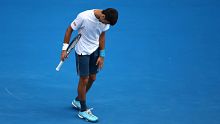- Kyrgios admits problems mental as well as physical
- Comment: The time for excuses is almost up
- 'A black eye for the sport': McEnroe
Another bizarre performance from Nick Kyrgios in just his second tour-level match since the 21-year-old was banned by the ATP for his Shanghai Masters meltdown has raised further questions over his temperament and emotional state. Kyrgios lost 1-6, 6-7 (1-7), 6-4, 6-2, 10-8 to Italian veteran Andreas Seppi, but that was just a fraction of the story.
More Tennis Videos
Kyrgios implodes as Barty and Tomic progress
Nick Kyrgios has imploded from two sets up to be knocked out of the Australian Open in day three as Ashleigh Barty and Bernard Tomic progress to the next round.
The contrast between the Kyrgios that bounced into the match and the morose, tortured version who inhabited the third and fourth sets of a second-round encounter that unfolded in such extraordinary circumstances was so extreme as to be bewildering. Did he want to be there? Was this all really happening? Again?
Two code violations, including a point penalty, were among the symptoms of a stunning loss of composure and intensity during the third set, when all seemed to be going along comfortably and Kyrgios - who had carried a knee injury into the tournament but won his opening match emphatically - was yet to face a break point.
Perhaps most tellingly, as Seppi served for the match for the first time at 6-5 in the fifth set, the 14th seed played a ridiculously casual, unnecessary "tweener" mid-rally. Hardly the shot selection of a man with his mind in the right place. Kyrgios still managed to win the point and then level the match on a Seppi error, but even then could have been easily confused with a man who had just lost.
The fact he was still in the match seemed almost accidental, and yet he then briskly held to love to get back in front. By virtue of serving first, he held a match point on Seppi's serve at 8-7, which the veteran saved with a marvellous forehand winner down the line.
Kyrgios was then broken in the next game, the 17th, hitting two double faults in the four points played after the Australian broke a string during the opening point. A fifth set that lasted 64 minutes and a match that went for more than three hours was eventually decided by Seppi's 16th ace. Kyrgios hit 28 among 57 winners, but also 68 unforced errors. Erratic does not start to cover it.
"I don't know, maybe it was meant to be. I don't know," Seppi said. "Of course it was a very tough match. I didn't start well but started to play better and better. Last time I was two sets to love up and lost and I thought I would try to do the same to him.

"I was more concentrating on my game, not looking too much what he is doing. It's always tough if you're mentally thinking he's not fit. I was focusing on my game and it worked out good for me."
What had been progressing smoothly enough was inexplicably derailed in the third set, almost without warning, at a time when everything appeared to be to plan against the veteran that Kyrgios had beaten in such rousing fashion after trailing by two sets to love in the fourth round two years ago. The Canberran nominates Hisense Arena as his favourite court, yet from mid-way through the third set it was more like a torture chamber.
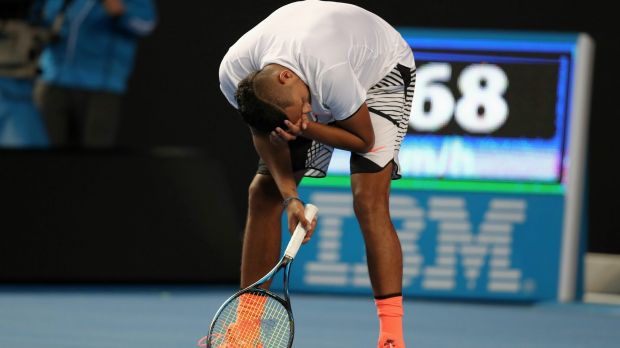
The irritability was first apparent at 6-1, 7-6 (7-1), 3-2, when he received a code violation warning for an audible obscenity directed towards his box and apparently related to his off-court training regimen since Monday's crushing defeat of Gastao Elias. "I didn't sign on for that shit," he said, and the f-word followed, as did an official tut-tutting from chair umpire Carlos Ramos.
Relevant here is the fact that the only time Kyrgios had lost a grand slam match to a player ranked outside the top 30 was a contest he could not complete - against Illya Marchenko in the third round of last year's US Open. That emotional flame-out was both a magnet for questions over his conditioning and the catalyst for the hiring of British expert Martin Skinner, who has been responsible for an overhaul of Kyrgios' off-court program. Before this match, struggling physically, he may have felt he was asked to do a little too much.
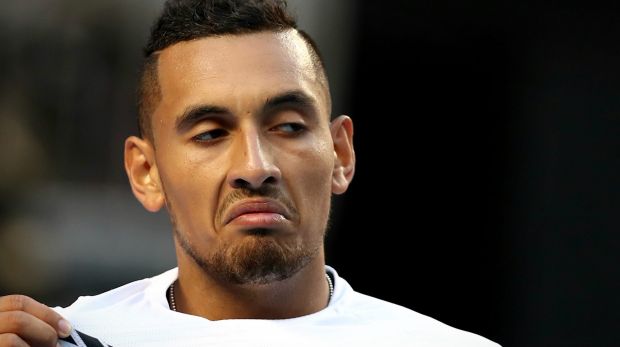
As the belly-aching continued, Kyrgios had his serve broken for the first time in the tournament at 4-4 and then threw his racquet at the changeover to earn a second code violation - and this time a point penalty - for racquet abuse. With a 15-0 headstart in his attempt to serve out the set, the Italian did so to 15 with an ace, and the match was transformed.
Even more so when Kyrgios fell behind 0-2 in the fourth, his temper threatening to boil over, implosion dangerously close. The body language was negative, the mood almost resigned, the interest negligible. "He's checked out," said Jim Courier in the commentary box. No kidding, even if his Davis Cup captain Lleyton Hewitt was determined to be more diplomatic, talking instead of clearly non-existent footwork, rushing, and the fact Kyrgios was feeling a little "flat". Yes, well, that was one word for it.
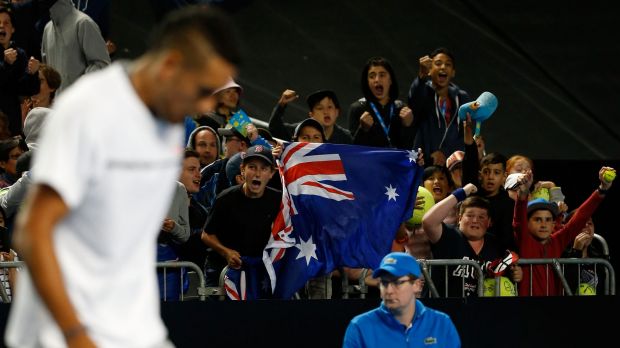
He was muttering to himself and reacting to the crowd, the shot selection as questionable as the execution. "It's his commitment level and his interest level and his excitement level, that's what's gone away," Courier said. Added Hewitt: "He plays his best when he's happy, when he's in that happy place. Right now, for some reason, he's not, and he's struggling."
Nothing could rouse him from his funk, and only half-heartedly was the switch flicked back on when everything was on the line in the fifth. As Hewitt warned, it was not the first time Kyrgios had left a match and then decided to attempt a belated re-entry. Recoveries are not guaranteed, and, ultimately, none was possible this time against a seasoned, admirable opponent.
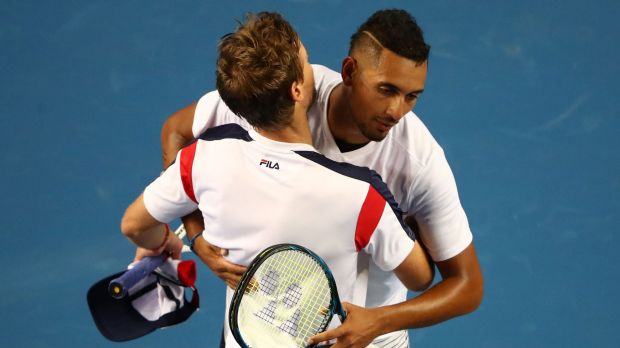
The fourth set over in just 25 lethargic minutes, as the commentary with his own team continued, none of it complimentary. Whatever Kyrgios has been talking about with the ATP-ordered psychologist in the sessions that allowed his Shanghai suspension to be reduced from eight weeks to three, there is clearly much more ground to be covered in the conversations to come.




